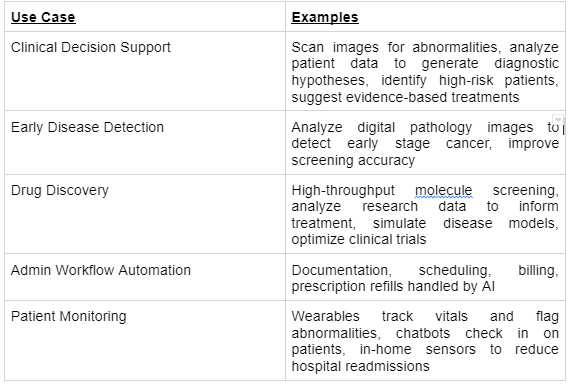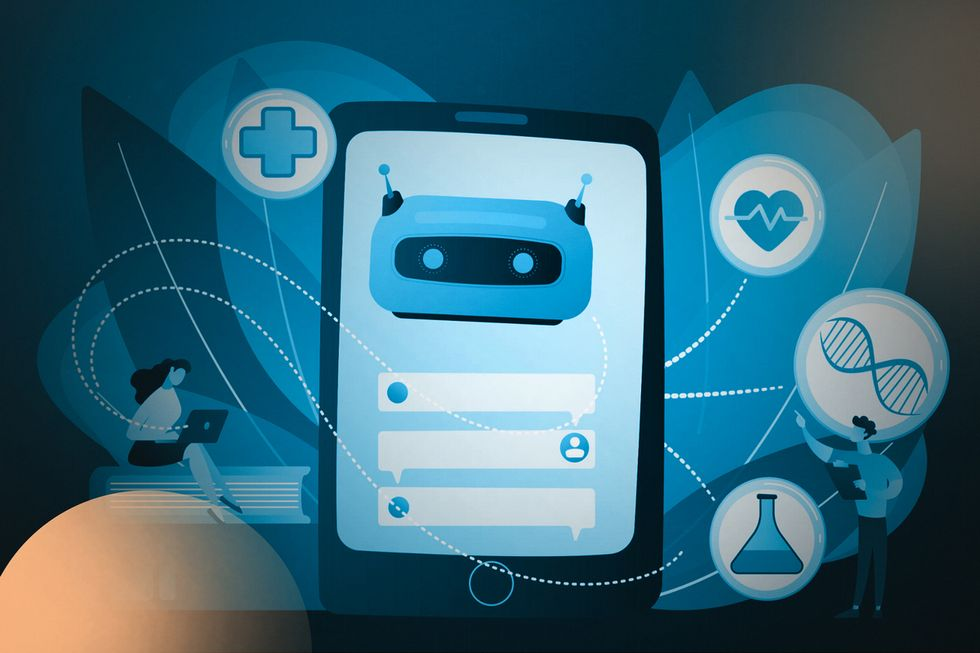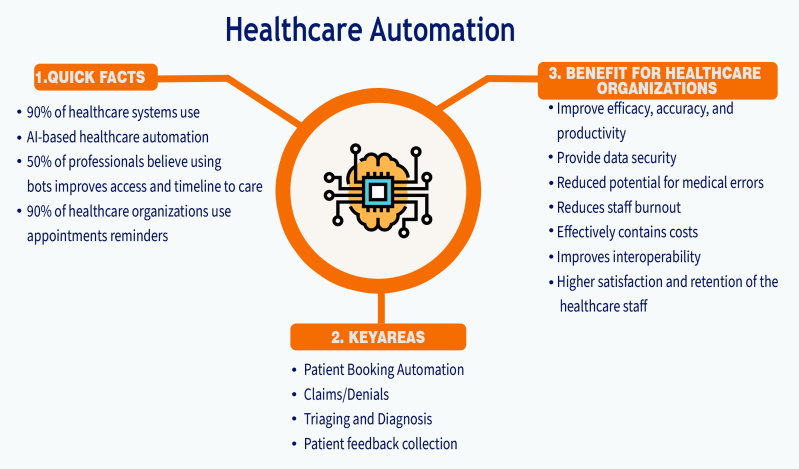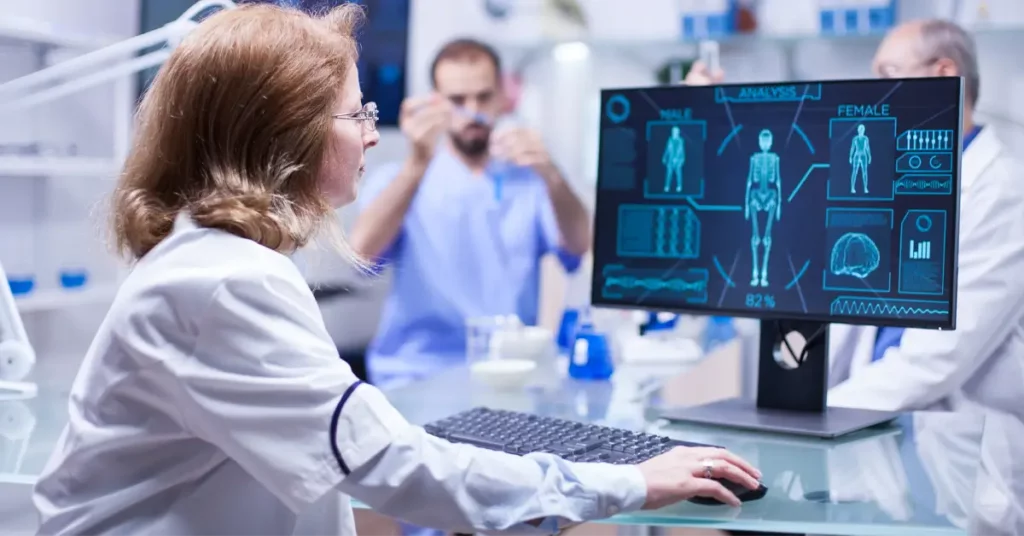
The healthcare industry generates a massive amount of data each day. There are patient medical records, radiology scans, clinical trial data, insurance claims information, and more.
Managing and deriving value from healthcare data is critical for improving clinical decision-making and patient outcomes. With so much data siloed across systems, key insights get buried. AI offers the capability to integrate and analyze patient information to detect patterns, predict risks, and inform better care plans. Unlocking the knowledge within the vast amounts of healthcare data is how AI tools can augment human clinicians and reduce medical errors.
AI excels at recognizing patterns and discovering insights from large volumes of structured and unstructured data. Healthcare app providers can leverage these capabilities to improve clinical decision-making, predict outcomes, and better manage population health.
The possibilities are endless.
Let's explore how AI can become your partner in providing better care.
The Promise and Potential of Healthcare AI
Before diving into specific use cases, it's helpful to understand the core benefits AI offers healthcare app development organizations:
- Finding patterns in large datasets to uncover new insights
- Making data-driven recommendations to improve clinical decision-making
- Automating repetitive, administrative tasks to increase efficiency
- Developing predictive models to manage population health proactively.
According to Accenture, AI could potentially save $150 billion annually for the US healthcare system by 2026. But what are the top cases for deploying it now?
Top 5 Healthcare AI Use Cases In Healthcare
Here are five areas where AI in healthcare app development can have the biggest impact:

Now let's explore each of these top use cases in greater detail.
#1. Clinical Decision Support
AI-driven clinical decision support (CDS) shows great promise for improving patient outcomes by enhancing diagnostic accuracy, providing treatment suggestions, and predicting health risks.
For example:
- Radiology image analysis algorithms can detect and classify abnormalities and lesions that human clinicians may overlook. By incorporating AI in a healthcare app, radiologists achieve a sensitivity boost from 65.1% to 70.3%, with a decrease in the false negative rate from 0.2 to 0.18. These changes in diagnosis impact 6.7% of cases.
- Healthcare app chatbots can interview patients about their symptoms and medical history, then suggest possible diagnoses aligned with that profile for doctors to evaluate.

- Predictive analytics applied to population health data enables earlier intervention for patients at elevated risk of conditions like heart failure, diabetes complications, or sepsis infections.
- By scanning medical literature and clinical guidelines, AI-powered healthcare app development can offer evidence-based treatment recommendations to reduce variation in care across providers and networks.
CDS allows clinicians to leverage data-driven insights to deliver more personalized, proactive patient care.
# 2. Early Disease Detection
Detecting conditions at their earliest stages when treatment is more effective can save lives. AI healthcare apps promise to improve screening and diagnostic accuracy for diseases like cancer.
For example, researchers have developed AI models to analyze digital pathology images of biopsied tissue and detect tiny cancerous lesions and anomalies that a human observer could easily miss.
One deep learning algorithm proved capable of AI detected 20% more cancers than the group in which mammograms were reviewed by two radiologists without the added technical support. Computer vision applied to medical images can literally save lives through earlier cancer detection.
#3. Drug Discovery and R&D
It takes over a decade and costs more than $2 billion to bring a new drug to market. Pharmaceutical companies are turning to AI to accelerate time-to-market and reduce those astronomical R&D costs.
Here are some drug discovery healthcare apps of AI:
- High-throughput screening of millions of molecules to identify potential drug compounds. AI models can predict interaction viability.
- Analyzing large volumes of research data to detect patterns and relationships that could inform new treatment approaches.
- Simulating the mechanics of diseases and testing drug effects on those virtual models. This allows rapid prototyping.
- Optimizing clinical trial enrollment by identifying eligible patients based on health records. This dramatically speeds up trial completion.
Merck claims to have reduced drug development timelines by 70% by using AI for computational research. The quicker promising drugs can complete testing, the faster they can reach patients.
# 4. Administrative Workflow Automation
Handling billing, scheduling, documentation, and other repetitive administrative tasks take time away from actual patient care. AI virtual assistants can automate these workflows to improve efficiency.

Some examples of automating administrative processes with AI include:
- Healthcare app development companies using voice recognition and natural language processing to document clinical encounters in EHR systems automatically. This saves doctors hours of manual paperwork.
- Building chatbots to handle appointment booking, billing questions, prescription refill requests, and other frequent patient inquiries.
- Digitizing and extracting information from unstructured documents like medical forms and faxes to reduce manual data entry. Document processing algorithms can capture this data.
- Applying robotic process automation to mimic administrative tasks and reduce repetitive manual work.
Automation of routine tasks allows healthcare professionals to dedicate more time to patients and critical job functions. It also reduces costly clerical errors caused by human oversight.
#5. Patient Monitoring and Connected Health
AI empowers patients to better manage chronic conditions outside the hospital setting. Remote patient monitoring generates insights to keep people healthier at home.

Some examples include:
- Wearable sensors that track vital biometrics like heart rate, respiratory rate, and glucose levels. Data feeds to apps that apply AI to detect abnormalities.
- Chatbots that act as virtual health coaches and ask patients about medication compliance, dietary habits, activity levels, sleep, and mood. The bots can flag concerns.
- Algorithms that analyze in-home camera footage to monitor patient mobility, fall risks, and activities of daily living so caregivers can intervene if needed.
- Voice recognition software that listens to patient speech patterns and screens for neurological conditions like dementia or depression. Changes in speech can provide early diagnosis.
Connected AI systems give patients personalized care while lowering hospital readmission costs. They also enable independent living for seniors and others with chronic illnesses or disabilities.
Challenges and Solutions for Healthcare AI
While the benefits are compelling, there are also challenges to address for successful AI adoption:
- Data Privacy and Security
Healthcare data is highly sensitive. Strict protocols must protect patient privacy as AI systems ingest and analyze this information. Solutions include decentralized data storage, encrypted data pipelines, and access controls.
- Implementation Hurdles
Integrating complex AI within existing health IT systems can be difficult. Poor data infrastructure also hampers deployment. Strategic partnerships between healthcare organizations and AI experts can smooth the process.
- Algorithmic Bias
If training data is imbalanced, AI models may propagate biases. Continual monitoring for fairness and representativeness is key. Diverse data sets and inclusivity in team composition helps mitigate bias.
- Clinician Buy-In
Doctors may distrust AI recommendations they don't understand. Transparency on how AI models work and perform is critical for user trust. Clinicians should be involved in designing AI tools.
- Governance Concerns
Regulations, accountability procedures, and technical audits are required to ensure patient well-being. AI governance in healthcare must be robust and proactive.
With collaborative partnerships, pragmatic design, and responsible oversight, the obstacles to healthcare AI adoption can be overcome. The need is great, and the potential impact makes this technological revolution worth the effort.
Conclusion
AI is transforming every facet of healthcare app development, from clinical decision-making to early disease detection to administrative tasks. As the amount of health data continues growing exponentially, AI will become essential to unlocking insights from that information.
However, AI is not a magic solution. The algorithms and models are only as good as the data used to train them. Thoughtful data collection, cleaning, and labeling is critical to developing accurate AI tools. Problems like bias must also be addressed to prevent automation from causing unintentional harm.
At Consagous Technologies, a premier healthcare app development company, we are excited by the monumental potential of AI in healthcare. But we also understand the challenges and ethical considerations involved.
Our experienced team can help healthcare organizations implement AI responsibly and effectively to transform medical processes for the better. Let's work together to build solutions that improve patient care through the power of AI! Get in touch with us today!
Get Free Consultation
Let our extended team be part of your journey and help you.
